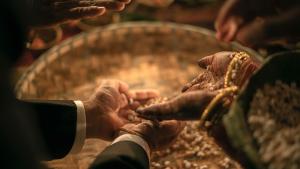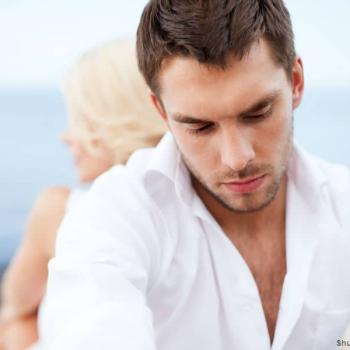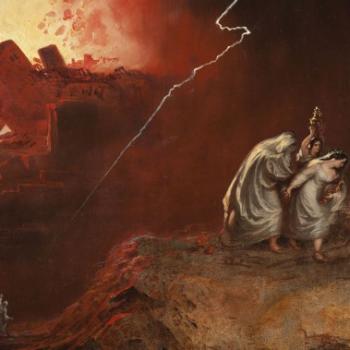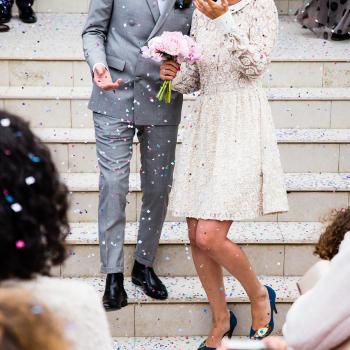 I straightened out my silver dress at the Four Seasons resort, cognizant of cameras perched on ladders and strategically placed uplighting. Six million people were about to witness this wedding on live television. It was 2014, and I was in a Santa Barbara audience chock full of reality TV stars. Some were teetering on gravity-defying heels; at least one was sporting a miniature dog in a purse. As a ghostwriter, I’ve been on a Romney presidential campaign bus, a Trump presidential campaign plane, the set of “Dancing With the Stars,” at 30 Rock, Fox studios, an Olympic gymnastics training center and — now — at a rare “Bachelor” wedding.
I straightened out my silver dress at the Four Seasons resort, cognizant of cameras perched on ladders and strategically placed uplighting. Six million people were about to witness this wedding on live television. It was 2014, and I was in a Santa Barbara audience chock full of reality TV stars. Some were teetering on gravity-defying heels; at least one was sporting a miniature dog in a purse. As a ghostwriter, I’ve been on a Romney presidential campaign bus, a Trump presidential campaign plane, the set of “Dancing With the Stars,” at 30 Rock, Fox studios, an Olympic gymnastics training center and — now — at a rare “Bachelor” wedding.
I was preparing to help former bachelor Sean Lowe write a memoir, which became “For the Right Reasons: America’s Favorite Bachelor on Faith, Love, Marriage, and Why Nice Guys Finish First.” I spied many of the show’s favorites in the audience — host Chris Harrison, Trista and Ryan Sutter, Molly and Jason Mesnick — as we watched Sean walk his mom down the aisle. This was my first wedding segmented by commercial breaks.
When the bride-to-be (and Season 17 winner) Catherine Giudici appeared, Sean’s eyes filled with tears. The audience rose, then something unexpected happened. The musical duo 2Cellos didn’t begin playing the traditional “Wedding March” or Pachelbel’s “Canon in D.” Evidently, amid the chaos of wedding planning, Sean and Catherine forgot to select a song. So 2Cellos called an audible — they played Michael Jackson’s “Human Nature.”
It was an interesting choice. The song is about being unable to control carnal desire, the opposite of Sean and Catherine’s relationship philosophy. If you watched Sean’s season of “The Bachelor,” then you’ve heard — a few thousand times — the nickname “The Virgin Bachelor.” At age 24, Sean had committed to save sex for marriage. He used the “overnight dates” to get to know the women instead of de facto honeymoon auditions. After his proposal, people couldn’t understand — or believe — the couple’s decision to wait 16 months between the proposal and the wedding. When they gamely took a lie detector test on a late-night show (and passed with flying colors), Jimmy Kimmel remarked, “I’m proud and disappointed at the same time.”
But tonight was the night. In her personal vows, Catherine said with emotion, “Sometimes I think I’m going to explode from how much I love you. … And tonight, we get to become one.”
The producers were ecstatic about the wedding, since successful “Bachelor” unions don’t frequently occur. In fact, Sean is the only “Bachelor” to have married the woman to whom he proposed on the show. This season, Matt James — a real estate broker — is trying to find true love in the show’s 25th season.
It’s been six years since Sean and Catherine’s wedding ceremony. They’re still together, and they’re the proud parents of three children. It’s the unusual success story for a show built on the promise of fairy tale endings and why so many of us keep coming back season after season. But the payoff is rare, and the show itself is often an impediment to love lasting beyond 10 episodes. The show’s rose ceremonies, it turns out, may actually hinder the likelihood of ring ceremonies.
Having written about “The Bachelor” at length (and watched more seasons than I care to admit), I’ve seen a pattern of obstacles that the participants must overcome to find true love. The challenge starts with the show’s timeline and competition, but it also extends to a franchise-wide culture of prioritizing hothouse drama, sensuous jacuzzi scenes and, during “The Bachelorette’s” last season, a strip dodgeball game. Mirroring broader cultural trends, intimate matters like faith, values and family are too often left on the cutting room floor.
I.
The scene is the same every season, and it’s always unbearably awkward: roughly 25 women exit a series of limos, full of Botox, lip injections and high hopes. The producers encourage the women to make a good impression, which results in many ill-advised gimmicks. Who wants to be known as the woman who needed an “emotional support cow” as happened in Season 24, or as the cadaver tissue saleswoman who brought in a slimy, fake heart in Season 19?
These strategies are necessary — there are more than two dozen female contestants each season. And a person’s natural charm simply can’t unfold organically over the course of eight weeks when everyone is jockeying for attention. Perhaps you could find true love in that environment, but could you do it while being filmed — or while your potential spouse dates 24 other people? That’s a lot to pack into a few months. Jason and Molly Mesnick admitted they fell in love after the show, not on it.
Yet, the girls (and the guys) try. They vie desperately for attention, attempting to share something special on that first, tipsy evening. Plenty of drinks meet the arrivals, and the show doesn’t reveal that these opening evenings actually stretch for hours. Participants, new to the whole phenomenon, usually don’t know to pace themselves as the show films all the arrivals, gawky greetings and confessionals. Presumably the resulting train wreck makes for good TV. The rose ceremony itself seems to last for about five minutes, but it takes a long time to actually film. When Sean’s first rose ceremony was finally over at 6 a.m., the host Chris Harrison made everyone breakfast burritos.
The highly packed environment reduces everyone to a walking elevator pitch, as they try to relay their relevant life information as quickly as possible. Conversations are squished into small moments, like Cinderella’s stepsisters trying on a glass slipper.
These brief chats are essential, since one-on-one dates are so few and far between. Ever notice no one really eats on those dimly lit romantic dates? That’s because the producers send food to the participants’ hotel rooms first, so they don’t slurp their meals on camera while wearing the super-sensitive microphones. This is not an easy environment in which to make a permanent, life-changing decision. And it even becomes harder when the kind of conversations that matter most when thinking about marriage — including personal values — are typically ushered away from cameras, if they occur at all.
II.
Marriage counselors aren’t shy about getting on the same page about topics like faith and values before tying the knot. Religion, however, is almost never brought up seriously on the show unless it’s a matter of contention. And this is true even when the participants themselves are overtly religious. In 2010, Jake Pavelka was nominated to be the “Bachelor” by members of his Methodist church who were tired of the drinking and sex of previous seasons. When asked, “What is the most important thing in your life?” Jake answered, “God.” When asked for his definition of love, he quoted scripture. That’s the most play his faith got.
Season 8’s bachelorette Emily Maynard didn’t announce herself as Christian, but viewers picked up clues: She prayed before deciding to go on the show, purchased a crucifix in one episode and mentioned a mission trip. She also said she wouldn’t have a sensuous Jacuzzi scene or cohabitate prior to tying the knot. One of her suitors — Jef Holm — had Latter-day Saint parents. However, their faith was essentially blurred out of the show like a wardrobe malfunction. During the hometown visit, Jef’s parents were described as “away doing charity work.” (They were mission presidents in South Carolina for The Church of Jesus Christ of Latter-day Saints.) Emily actually later confessed to being attracted to Jef’s knowledge of scripture and even considered converting to the church, though none of this was on the show. In the end, it didn’t seem that this kind of faith exploration and journey was given the space that personal religious discovery deserves.
Other Latter-day Saint participants have been on the show, but with the rare exception their faith has been discernible only from their Utah addresses or short bios on the show’s website. Independently produced internet spinoff shows called “The Mormon Bachelor” and “The Mormon Bachelorette” have popped up attempting to create marriages, without the alcohol, sex and drama of their ABC counterparts. After various copyright violations, a handful of cringeworthy seasons and some laudatory success in producing marriages, those shows ceased only to give way to an admittedly less serious iteration called “Provo’s Most Eligible.”
During Season 15 of ABC’s “The Bachelorette,” faith spilled out into the open, but rather than a nuanced portrayal, the show’s narrative became a subtle manifesto against “outdated” religious ideology. Bachelorette Hannah Brown initially bonded with the “good Christian boy from Gainesville, Georgia” Luke Parker over their shared spirituality. But, after a hometown visit to Luke’s pre-church Sunday School, the storyline shifted to how his faith principles were too controlling. This caused Hannah to declare, “I have had sex … and Jesus still loves me.” The confrontation seemed ginned up for cameras — devoid of any respectful discussion of differing religious convictions.
In Sean’s season — the one whose wedding I attended — the show never tied his decision to wait until marriage for sex to his religious convictions. When his season came down to two women — Catherine and Lindsay Yenter — most assumed he’d select the latter since she ostensibly shared the same faith. However, going into the finale in Thailand, he still hadn’t made up his mind.
The viewers at home didn’t see Sean’s late-night request to see Catherine in her hotel room to discuss her receptivity to Christianity, a factor he wanted to determine before proposing the next day. The producers stood by their iron-clad “no interaction off camera” rule. The whole series is geared to catch the surprised joy of the woman’s face when the bachelor drops to one knee. Millions of dollars are invested to capture that one, romantic shot. They weren’t about to let Sean accidentally spoil the surprise because of Jesus.
Yet, he persisted. He believed God was the highest expression of love and our search for a semblance of that on earth reflects something mysterious and important of that divine quality. So, the producers escorted Sean to Catherine’s hotel room and pressed their ears to the door to make sure no secrets were shared. But Sean didn’t reveal that he’d propose to Catherine the following day. All the nervous producers probably heard was sincere talk about faith, about the values that make for real, lasting intimacy.
III.
The first season of “The Bachelor” debuted in 2002 — the same year Elizabeth Smart was kidnapped and Kelly Clarkson won the original “American Idol.” In the ensuing 19 years, much has happened in the culture, especially in the world of relationships. Recently, the rise of the #MeToo movement caused us to take more seriously the problems arising from radical power imbalances in relationships. When it comes to the dynamic of “The Bachelor,” one can’t help but raise these questions.
This, of course, is true by design, which is why feminists have to let their ideology take a back seat to their enjoyment of the drama. In a Vogue article trying to get to the bottom of why feminists watch, Huffington Post editor Emma Gray said, “‘The Bachelor’ is something that we can sink our teeth into as engaged feminists. It taps into all of these really base and often regressive ideas our society has about how love and sex and courtship should look. That makes it really ripe territory to analyze from a sociological perspective.”
Maybe. But isn’t it just fun to see people fall in love?
When Matt James (this season’s bachelor) was announced on “Good Morning America,” the host told James, “It’s … a guilty pleasure we’re not supposed to take seriously in the grand scheme of things.” He’s partly correct: Many viewers seem to watch it ironically — as a part of a social phenomenon that includes viewing parties and hashtags and water cooler conversations.
This posture seeps into the show itself. Very rarely do the bachelors or the bachelorettes come on the show “for the right reasons.” Frequently, the men’s applications are sent in by others (as in the cases of Pavelka, Lowe and more) which creates a sort of passive, let’s-travel-to-exotic-locations-and-see-what-happens vibe.
That’s hard to balance with participants who had to take off time from work for an undetermined period, leave children in the care of others or buy all of their own clothing.
They also have to do their own hair and makeup. But there’s a pressure to play down the importance of the show and the occupational and financial sacrifices, especially for the women. It’s considered unattractive to go on the marriage show if someone is too “into” getting married. This means when there’s conflict in the house, usually the participant who cares too much is sent home.
In Season 24, Kelsey Weier left the show before her rival, and the eventual winner, Hannah Ann Sluss. And yet, it was Kelsey who brought an expensive bottle of champagne to share with bachelor Peter Weber, and it was Hannah who mistakenly opened it before Kelsey ever got the chance to. Really, who would bring such an expensive gift to share with a stranger? And who would make a fuss that it was opened? Have some self-respect, right? There’s a fine line between desire and dignity, it seems. We tend to secretly walk that line like a tightrope, teetering above our deepest longings while acting like we’re on a casual stroll.
“We are not as cynical as we pretend to be,” writer Roxane Gay observed in The New York Times. “The real shame of ‘The Bachelor’ and ‘The Bachelorette,’ of the absurd theater of romantic comedies, of the sweeping passion of romance novels, is that they know where we are most tender and they aim right for that place.” And so, we gather around the electronic hearth and mock others for their desire to seek love while our hearts are actually tugged and our hopes elevated beyond what is reasonable for highly orchestrated dates on a reality show.
The truth is that our deepest desires won’t be satisfied by romance alone — our own or that of a stranger on TV. Maybe when 2Cellos began playing that Michael Jackson song, it was both more — and less — subversive than I thought. The show, after all, thrives on our most natural human longing for true, genuine — even godly — love. It’s the song we all hum. But just as the beautiful food arranged on the plates is for show, we know what we’re watching isn’t aimed to sate us. Designed for an enduring transcendent love, too many of us find ourselves famished for it. And that’s enough to propel us back to the table week after week, season after season, year after year — in the hopes of catching a taste of the real thing.
By Nancy French. Nancy is a five-time New York Times bestselling author. She’s also written opinion pieces for the Washington Post, USA Today, and National Review.













